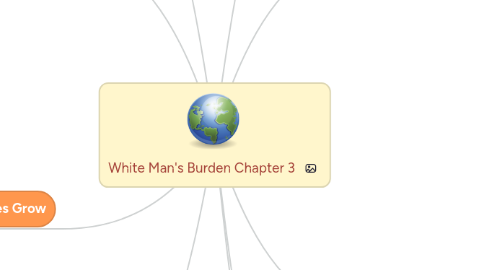
1. Extractive economic systems are capable of creating large amounts of short term growth but cannot produce sustainable long term growth.
1.1. Cheating
1.1.1. Social attitudes towards trusting strangers are strongly correlated with material wealth. Therefore, it is harder to trust people in poor economies
1.2. Preventing Cheating
1.2.1. In many societies, family businesses, and racial castes emerge as trust-networks who share information about their members, limiting and preventing cheating.
1.3. Property Rights
1.3.1. In many environments, it is costly to protect one's own property. In richer societies, people behave in less predatory manner, and so even in the absence of formal systems to protect property rights, less investment is needed.
1.4. Creating Property Rights
1.4.1. In developing economies, property rights can be defended informally through self-protection groups , where a group based on a family or tribe collectively defend their property from other groups. Not always ideal situations, such as the Mafia, war lords, clan leaders, etc.
2. Evidence and Supporting Material
2.1. The economist George Akerof of Berkely won the Nobel Prize for this kind of insight, applied to sales of used cars. Even slightly used cars sell for far less than new cars because buyers have no information on the cars' quality (and used car sellers have a tendency to sell lemons) p96
2.2. "This great achievement of markets is achieved through Searchers. The suppliers search for customers, the customers search for suppliers, and the price adjusts up or down to equate with supply and demand." Pg 73
3. Organizational Structure
3.1. The Failure of the Big Push
3.2. The Flight of Icarus
3.2.1. Russian Nights
3.3. I'm Hungry-Let's Invent Free Markets
3.4. Financial Markets Are Good, Too
3.5. Bottom-up Problems with Markets
3.6. Can I Trust You?
3.7. It's Whom You Know...
3.8. The Market Net
3.9. Showdown at Predators' Pass
3.10. Property RIghts
3.11. George Washington Slept Here
3.12. To Title or Not to Title?
3.13. Titling Toward Confusion in Kenya
3.14. Bottom-up Legal Evolution
3.15. Finance Without Good Laws
3.16. Top-down Dreams
3.17. Stagnant Economics, Dynamic Individuals
3.18. Miracle in Xiaogang
4. Critique & Questions
4.1. Easterly was quite difficult to understand as his ideas were scattered and improperly organized.
5. Central Puzzle
6. Active Reading Strategies
7. Poverty Trap
7.1. Poverty
7.1.1. Economic growth is hindered by poverty
7.2. Geography
7.2.1. The physical location including lack of transportation and resources can lead to poverty
7.3. Fiscal Trap
7.3.1. No money for investment
7.4. Governance Failures
7.4.1. corruption leads to lack of governance for economic growth
7.5. Cultural Barriers
7.5.1. Minorities and women may be hindered which leads to inefficiencies in the market
7.6. Geopolitics
7.6.1. barriers in trade blocks exports
7.7. Lack of Innovation
7.7.1. No new products to add to the market and make money off of
7.8. The Demographic Trap
7.8.1. Higher populations in poor countries- more people that need resources and food
8. 4 Ways Economies Grow
8.1. Savings
8.1.1. Household savings lead to: 1) capital accumulation and 2) increased per capita productivity
8.2. Trade
8.2.1. Specialized trading firms grow out of the growth in a particular industry
8.3. Technology
8.3.1. New technologies increase efficiency and productivity
8.4. Resource Boom
8.4.1. New discovery, accessibility, or availability of some resource leads to more of that capital resource per person
9. 6 Ways Economies Diminish
9.1. Lack of Saving
9.1.1. Income goes to household consumption
9.2. Absence of Trade
9.2.1. Lack of infrastructure inhibits trade
9.3. Technological Reversal
9.3.1. Having a lack of knowledge of technology decreases income
9.4. Natural Resource Decline
9.4.1. Lack of fertilizer funds can deplete farmland and decrease productivity
9.5. Adverse Productivity Shock
9.5.1. Natural disaster decreases income
9.6. Population Growth
9.6.1. As population grows, land gets divided between families and everyone owns less
